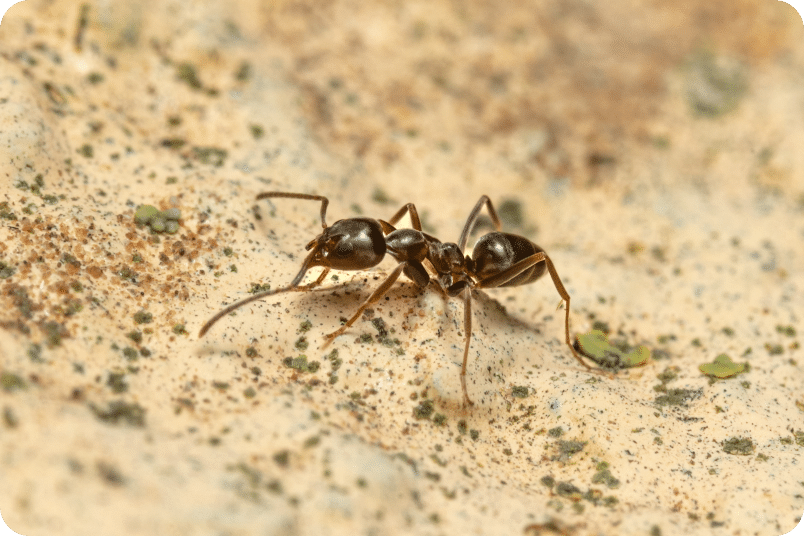Imagine your home as a cozy place where you feel comfortable and at ease. What would you do if tiny pests tried to ruin that? That’s what happens when odorous ants make their way inside.
This type of ant can be sneaky, but don’t worry! Knowing how to get rid of odorous house antsis simpler than you might think. This blog will give you more insights about this ant, strategies, and preventive tips that will make a complete difference inside your house (and even outside!).
What Are Odorous Ants?

These ants are common ants that can disrupt your home’s peace. They are known for their unpleasant smell and are often compared to a rotten coconut. Here are some common characteristics and behaviors to help you identify them:
- Size: They are small, typically about 1/16 to 1/8 inch long.
- Color: They are brown or black.
- Movement: They move in erratic patterns.
- Colony Behavior: They form large colonies.
- Diet: They are attracted to sweet foods but also feed on grease.
- Habitat: They are often found foraging in kitchens and pantries.
Why Odorous Ants Are a Nuisance
These ants can be a real headache for homeowners. They invade spaces in large numbers, contaminate food, and can be hard to control once they form a colony indoors. Their presence can be particularly frustrating due to the strong odor they release when disturbed.
Odorous House Ants: Life History and Behavior
Understanding their life cycle and behavior can help you manage and prevent them from entering your house. These ants progress through egg, larva, pupa, and adult stages. Queens can lay hundreds of eggs, leading to rapid colony growth and challenging infestations.
Odorous house ants are highly adaptable and can nest indoors. They prefer warm, moist environments and are often found in:
- Wall voids: Hidden spaces within walls provide a warm, protected environment.
- Underfloors: These areas offer moisture and shelter, which are ideal for nesting.
- Around insulation: Insulation materials can trap heat and moisture, attracting ants.
Their foraging behavior is driven by their attraction to sweet foods, making kitchens and pantries typical hotspots. Knowing their life cycle, behavior, nesting sites, and even food resources will give you the advantage of keeping them away from forming a colony near or inside your place.
How to Identify an Odorous Ant Infestation
Recognizing the early signs of a colony buildup can help you address the problem before it gets out of hand. Here are some tips on how to identify an odorous ant infestation:
- Visual Signs: These ants are tiny, dark, and moving in erratic lines, especially near food. You might also notice them trailing along baseboards and countertops.
- Common Nesting Areas: Kitchens, bathrooms, and near food sources. Nest in rocks, mulch, or logs, etc. They often prefer warm, moist environments.
- Difference to Other Ants: They are pretty similar to pavement ants, but the odor is the best distinguishing factor for these ants.
How to Get Rid of Odorous House Ants: 6 Common Preventive Tips

Taking proactive steps can significantly reduce the chances of an outbreak. Below are some common preventive measures for getting rid of odorous house ants.
Keep Your Home Clean
Regularly clean your kitchen and dining areas to ensure crumbs and spills are promptly wiped up. Take out the trash daily and make sure the bins are tightly covered. Regular cleaning reduces the chances of attracting ants.
Seal Entry Points
Inspect your house for cracks and gaps around windows, doors, and foundations. Use caulk or weatherstripping to seal these entry points and prevent ants from entering. Regular maintenance can keep your space secure from pests.
Use Ant Baits
Place ant baits where you frequently see ant activity, such as along baseboards, under sinks, and near entry points. Ant baits can attract foraging ants, carrying the poison back to the colony, effectively reducing the population. Be sure to follow the manufacturer’s instructions for effective use.
Store Food Properly
Store food, especially sweets and grains, in airtight containers. Keep ripe fruit in the refrigerator and clean up spills immediately to avoid attracting ants. Proper storage minimizes the risk of an ant invasion.
Inspect Your House Regularly
Make it a habit to check common ant entry points and nesting areas regularly. Early detection can help you address potential outbreaks before they become a bigger problem. Regular inspections can save you from future headaches.
Manage Moisture and Humidity Levels
They are attracted to moisture. Fix leaky pipes, faucets, or roofs, and use dehumidifiers in damp areas like basements and crawl spaces. Keeping your place dry can effectively remove these pests.
How to Get Rid of Odorous Ants: 6 Long-Term Prevention Tips

While common preventive tips can help you manage odorous ants, adopting a long-term prevention strategy will add more steps for keeping them at bay. Here are some effective long-term prevention tips you should know:
Keep Your Home in Top Shape
Seal cracks, fix leaks, and maintain a clean environment to keep your place in good repair. You should also regularly inspect and clean the gutters to prevent moisture buildup. Implementing good sanitation practices, especially during late spring and early summer, helps create an inhospitable environment for ants.
Landscaping and Outdoor Measures
Trim back plants and bushes that touch your home, as these can provide a bridge for ants to enter. Keep mulch and firewood away from your foundation to reduce nesting sites. Maintaining a clear perimeter around your space can deter ants from approaching.
Use Natural Repellents
Incorporate natural repellents such as essential oils (e.g., peppermint, tea tree, or citrus) into your cleaning routine. These oils can deter ants and other pests. You can create a simple spray by mixing a few drops of essential oil with water and applying it to areas where ants are commonly found.
Consider Seasonal Changes and Plan Ahead
Ant activity can increase during certain times of the year. Be extra vigilant during spring and summer when ants are more likely to forage and establish new colonies. Adjust your prevention efforts seasonally to stay ahead of potential infestations.
Educate Family Members
Ensure everyone in your household understands the importance of cleanliness and proper food storage. Collective effort can significantly reduce the chances of an invasion. Regular reminders and shared responsibilities can make a big difference.
Seek Expert Guidance
Consider scheduling regular inspections with a professional pest control service. These professionals can provide valuable insights and recommend solutions to help you maintain a comfortable home environment.
How to Document Findings for Effective Ant Control
A detailed log of your observations and actions can significantly enhance your ant control efforts. Here’s how to effectively document your findings:
- Track Sightings: Record the locations and times you spot ants. Note any patterns or trails in their activity, like under baseboards or carpet edges, specific areas they frequent, or the most active times of the day.
- Log Methods Used: Document the various methods you’ve employed to control the ants, including homemade baits, natural deterrents, and cleaning routines. Be specific about the ingredients and techniques used.
- Adjust Strategies: Use your log to identify patterns and make informed decisions about adjusting your ant control methods. This ongoing documentation can guide you in refining your approach for better results.
When to Call a Professional for Odorous Ants

Sometimes, despite your best efforts, these ants can be stubborn and difficult to eliminate. Knowing when to seek professional help can save you time and frustration.
Signs That You Need Expert Help
If you notice large numbers of ants, persistent detection, or cannot locate the nest, it might be time to seek professional assistance. Professionals can provide you with targeted treatments to address the issue. They bring every necessary tool to tackle even the most challenging outbreaks.
What to Expect from a Professional Pest Control Service
A professional will assess your place, identify the type of ant, and recommend a treatment plan. They will treat accessible areas inside and outside to help manage the infestation. You can expect a smooth pest control solution and a customized approach that fits your situation.
How to Choose the Right Pest Control Company
Look for a company with positive reviews and a good reputation. Check if they offer services that are perfect for your specific needs and are willing to answer any questions you have about the process. Choosing a trusted company means partnering with a team committed to helping homes and communities, one home at a time.
Experience the Aptive Difference—Get a Quote Today!
At Aptive, we understand how important it is to feel at ease in your space. Our dedicated team is here to provide tailored ant control service, ensuring a comfortable space. We adhere to Environmental Protection Agency standards and are proud members of The Professional Pest Management Alliance, reflecting our commitment to quality and community.
Don’t let odorous house ants disrupt your peace—contact us for a free quote and discover how our tailored solutions can help you reclaim your space!









